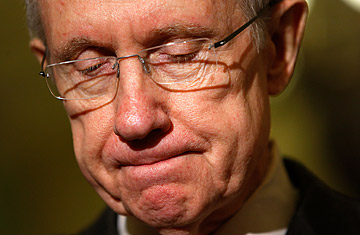
Senate majority leader Harry Reid
Most of the Democratic fretting thus far in the election season — and with nine months to go, it's still early on — has been focused on potentially losing their 39-seat majority in the House. After all, Democrats control the Senate, where incumbency rules, by a comfortable 10 votes, and only 37 seats are up for grabs this year. However, recent retirements, worrisome poll numbers for several incumbents and the entrance of some strong GOP challengers have prompted a wave of concern for Senate Dems. While still unlikely, if a perfect political storm were to occur, there is a chance that Democrats could lose the Senate. Here's what would need to happen:
Open seats likely to switch: At least two seats are all but write-offs for Democrats: North Dakota and Delaware. Delaware Attorney General Beau Biden's decision not to run for his father's old job means Dems have lost their best hope at keeping the seat from the popular, eight-term moderate Republican Congressman Mike Castle. And Byron Dorgan's retirement opens up a blue seat in a red state in a year that's trending red. Dems had no better candidate than the three-term Dorgan, who felt that even he couldn't win in this climate. "North Dakota is pretty much gone, and Delaware has become very difficult," says Jennifer Duffy, Senate editor at the nonpartisan Cook Political Report, which tracks congressional races. "This gets Republicans to 43."
Vulnerable swing-state Democratic incumbents: Senate majority leader Harry Reid leads the list of vulnerable incumbents. The Nevada Democrat trails by double digits in theoretical matchups with not one but two would-be GOP challengers — a former Miss America runner-up and the son of a legendary but scandal-plagued college basketball coach, which gives you an idea of how shallow the Nevada GOP bench is and how much trouble Reid is in. Despite the millions of dollars he has already spent on TV and radio ads promoting all he's done for the Silver State, his approval ratings have hovered near the 30% mark. As a mark of how worried Dems are, when asked repeatedly to comment about potential Democratic losses, Eric Schultz, a spokesman for the Democratic Senatorial Campaign Committee, didn't return the e-mails.
Recent polls must have Arkansas Democrat Blanche Lincoln blanching; three surveys in the past two weeks have shown her losing by double digits to four different candidates. Making things worse, this week Representative John Boozman (brother of Faye, whom Lincoln narrowly defeated to win the seat in 1998) announced that he plans to challenge the recently named Agriculture Committee chairman, presenting her with the toughest competition yet in her bid for a third term.
The races for President Obama's old Senate seat in Illinois and that of Energy Secretary Ken Salazar in Colorado also have Democrats worried. In Illinois, the GOP has found a strong candidate in four-term Congressman Mark Kirk, a moderate. Kirk will square off with state treasurer Alexis Giannoulias, a banking heir whom Republicans have wasted no time portraying as part of the state's corrupt political culture. Given Illinois voters' disgust over the recent impeachment of Governor Rod Blagojevich, painting Giannoulias in this light could seal his fate. Before Giannoulias was even certified as the Democratic nominee, Republicans were running television ads comparing him to Tony Soprano, hinting heavily that Giannoulias is mired in ethics probes — allegations he has denied. In Colorado, Michael Bennet, appointed to fill Salazar's seat, has been struggling to build name recognition and gain traction with voters. The former superintendent of Denver public schools must overcome a primary challenge from former Colorado house speaker Andrew Romanoff before he takes on the likely GOP nominee, Lieut. Governor Jane Norton.
Arlen Specter did himself no favors when he switched parties last year. He did so on the expectation that a moderate Republican couldn't win Pennsylvania (or at least the Republican primary), since Obama won the state in 2008 with 55% of the vote. The five-term veteran may well be wishing he hadn't bolted, since he would probably have an easier time keeping his seat if he'd stayed a Republican. Specter is facing a strong primary challenge from Representative Joe Sestak, a former Navy admiral; both men trailed former Club for Growth front man Pat Toomey in a recent Franklin & Marshall poll.
This week also brought bad news for Indiana's Evan Bayh, with former Senator Dan Coats' announcement that he might run for Bayh's seat. Coats held that seat for a decade before Bayh. There has been a lot of angst in recent months over the speculation that Bayh, a former governor and moderate two-term Senator, might retire — a move that would make his seat infinitely more difficult to defend. "If it wasn't this close, Coats wouldn't have decided to run," says Charlie Cook, editor of the Cook Political Report. "For the first time, there's now a mathematic possibility — however unlikely — that the Republicans could take back the Senate."
